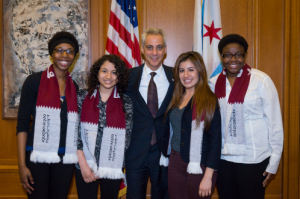
Mayor of Chicago,Rahm Emanuel, with the four members of the debate team
Four students from Robert Lindblom Math and Science Academy in West Eaglewood, Chicago took part in a debate hosted in Doha, Qatar. The debate teams were made up of mostly native Arabic speakers. Hence these students from Chicago were up against some stiff competition, as they had only studied the language for a few years.
LaCharro Hawkins, 18, was one the team members and mentioned that they were not there to win, but to learn more about the culture and become more proficient in the Arabic language.
The students were given eight topics to prepare for the debate. Not only did they have to prepare relevant arguments, but also translate their debates, which required some extra effort on their part. It was also important for them to anticipate what the other team’s arguments could be beforehand. Once engaged in the debate, they had to try to understand the other team’s argument and still be able to defend theirs and put forward a relevant argument.
The debate discussions revolved around different topics, including, government surveillance, which required a fair amount of work to come up with a relevant discussion in another language. Their teachers assisted them with their preparation, translation, and pronunciation, which were vital to their debates.
The principal of the academy, Alan Mather, felt that he wanted to offer the students exposure to other foreign languages, and not just the usual French and Spanish courses which the students do in America. He saw Arabic as a language which would help to “bridge a cultural divide” among students.
This year nearly a third of the students attending Lindblom are taking the Arabic course this year. Many students, including the four members of the debate team, were not all that keen on studying the language and struggled at first, but found themselves enrolling, as the Mandarin course which they preferred, was already full.

Robert Lindblom Math and Science Academy
Brenda Marcais, 15, started taking Arabic as a seventh grader, and would often become upset when she could not understand the language and said were many times when she almost gave up. But she and many of the other students have grown to love the culture which has helped a lot to improve their studies. Now, all four of the students on the debate team hope to continue with Arabic once they go on to university, and hope that it will open more doors for them, not only in America but abroad as well.
In Qatar, the students had a quite a challenge as they faced opponents who were native Arabic speakers from Jordan, Egypt, and Lebanon. They also took part in debates with students from Singapore and Malaysia who had been studying Arabic since they were in grade one.
Nevertheless, they had a positive attitude and did not let their disadvantage of having to debate in a difficult language like Arabic set them back at all. The students were ready for the challenge, and excited about the opportunity of going to Qatar to take part in the debate.
